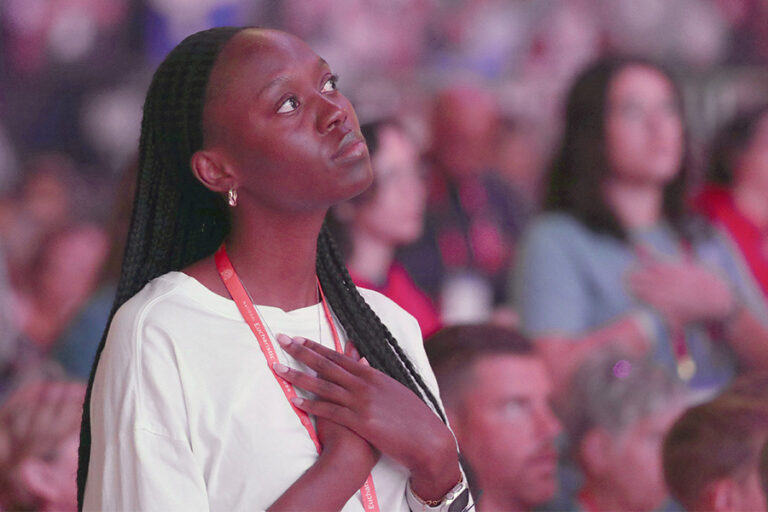“I’ll be with you in a minute, Mr. Peabody!”
That’s the line Cary Grant shouts repeatedly at a philanthropist he is about to meet in the 1938 screwball comedy, “Bringing Up Baby.”
Grant, who plays David Huxley, a paleontologist, is hoping to schmooze a bit of museum funding from Mr. Peabody over 18 holes, but the scatterbrained Katharine Hepburn keeps preventing the meet-up. Grant is left to shout “Be with you in a minute, Mr. Peabody,” even as he is stranded on Hepburn’s running board and headed in the wrong direction.
I imagine that some women in the church — particularly those who have been advocating for an ordained female diaconate — must feel a little bit like Mr. Peabody, lately. They keep showing up in Rome, at this gathering or that, expecting to meet up with a church that has a plan for them — some readied outline, some sort of solid proposal demonstrating that there has been (in the spirit of “synodality” and the more “synodal” church the pope has been shepherding since 2021) real listening to, and actual hearing of, and seriously constructive thinking about their ideas; proposals readied that — leaving ordination off the table — can harness the callings and talents of women eager to serve the church in more formally recognized fashion.
Instead, like the puzzled Mr. Peabody, they watch as the church leadership shifts and spins and calls out, “We’ll be with you in a minute!”
Meanwhile, decades drive on by.
At this point, the question of an ordained, clerical female diaconate is pretty much dead in the water. When asked about it last May by CBS’s “60 Minutes” Pope Francis replied. “No. … If it is deacons with Holy Orders, no. But women have always had, I would say, the function of deaconesses without being deacons, right? Women are of great service as women, not as ministers, as ministers in this regard, within the Holy Orders.”
In October, Cardinal Víctor Manuel Fernández, prefect of the Dicastery for the Doctrine of the Faith, reminded participants at the Synod of Bishops meetings on synodality that Pope Francis considered the female diaconate question as immature; that “there is still no room for a positive decision” on that front.
He did say that his synodal study group would explore ways — excluding ordination — to expand the recognition of female leadership. Cutting to the chase, that synodal study group — whose members remain cloaked in secrecy — essentially ended up on a speeding sideboard, calling “Be right with you, girls! You keep studying it and meanwhile, we’ll figure out something nice for you,” as it pulled away.
Fernandez told waiting participants “… you can continue to study [the question] patiently, without obsession…” A commission established in 2020 to study the issue would be revived, he announced, adding, “I am convinced that we cannot wait to take steps forward for the empowerment of women in the church.”
Maybe “empowerment” is not the word we should be using. It only emphasizes a clericalist mindset when clericalism is arguably considered detrimental to a church baptized into common priesthood with Christ and all believers. “Empowerment” is a word that begs layfolk to see ministerial offices as something achieved, owed or deserved, rather than bestowed; it inspires a “give me,” rather than a servant’s “please take.”
The Catechism of the Catholic Church beautifully states the reality of the priestly laity: “They are ‘a chosen race, a royal priesthood, a holy nation'” (CCC 1268).
The church affirms the priesthood of its laity but hasn’t managed to coherently manifest it to the world through the lived lives of its members. But finding prayerful, faithful people (both women and men!) who love the church, understand its teachings and wish to serve should not be difficult.
Layfolk can be trained to baptize or trained and certified to officiate at weddings and funerals with Liturgies of the Word. They can be assessed and approved for preaching.
Service is about willingness, not worthiness; the church needs to be willing to actually sit down and create a plan for the creation of formal lay ministries, and then do it.
And while planning, leadership should remember that academic credentials — while useful — speak nothing to holiness; let them remember those poor students Blessed Stanley Rother, Blessed Solanus Casey and St. John Vianney, or the holy non-degreed saints, Catherine of Siena, Teresa of Avila, Hildegard of Bingen, Therese of Lisieux as they envision a new form of service and build a program of participatory lay ministry, so that the people of God may answer where called, and help their exhausted priests shepherd the wandering flocks.
Read More Commentary
Copyright © 2024 OSV News








